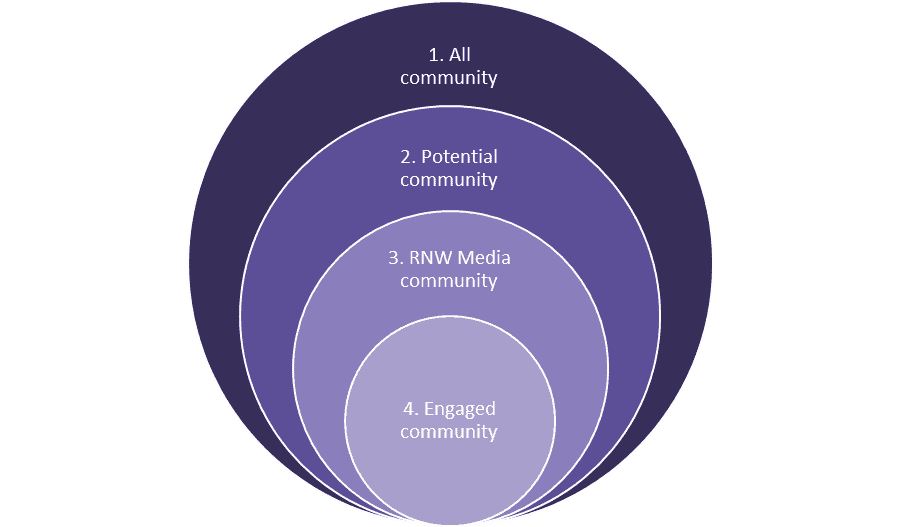Inclusive Communities

The Citizens Voice websites and social media platforms provide a growing number of opportunities for young people to discuss content and engage in debate on the issues that are important to them. The Citizen’s Voice programme aims are to ensure these platforms are inclusive and safe, and that the platforms are the place online where young people can ask questions and will always find quality, balanced, innovative and, above all, intelligent discussions. Though understanding that users have a loud, public voice, they are encouraged to stay positive and on topic, to drive the conversation further.
We treat everyone as equal and encourage open debate with a view to bringing about behavioural and policy change for the common good. In the plurality of political views, we facilitate non-polarising discourse and the confrontation of societal prejudices.
Through the implementation of our content and engagement strategies, we strive not only to include young people from different backgrounds (demographic and ideological) to engage on our platforms, but also to engage in discussion with each other. We aim to encourage participation of and dialogue between:
- Young people from regions
- Young people of different tribes, religions, other socio-cultural backgrounds
- Young women and men
- Young people to engage in discussion with influential actors
Engaged community, followers and the potential wider community
An online community can be much more than just fans or followers. For RNW Media, communities have to contribute to a world where young people in restrictive settings confidently claim their rights, assume their place in society, and shape a better future. Communities aim to celebrate diversity and promote inclusion.
The core communities will lead the discussion on the platforms and beyond, as well as influence other community members in order to amplify messages, ideas or beliefs. Think of the core community as a direct follower on any platform. For RNW Media, these people are directly connected and receive regular updates, and engage in discussion with other community members. Each individual community member has the potential to transfer knowledge and attitudes to other communities. They can expand reach and spread values and beliefs to wider communities in their social circles.
Core communities, in contrast to non-core communities, can share content, interact, participate in discussions, advocate for values and beliefs, and influence the mind-set of their peers related to the values and the beliefs that the platform aims to contribute to.

Different layers within your online community can be identified. This graphic explains the different layers within a community, with the example of RNW Media’s community:
- All community: The total number within the society that RNW Media targets (in this case, young people age 15 – 30)
- Potential community: Who can potentially become RNW Media’s community. External factors play roles in defining this number such as internet penetration, economy.
- RNW Media community: All people who follow RNW Media projects on Facebook, YouTube, etc.
- Engaged community: The “super users”, or the core community, of RNW Media who engage constantly on many touchpoints/platforms.
Community guidelines
Though we celebrate diversity, core values should include respect, freedom of choice, open dialogue, acceptance, inclusion, and trustworthiness. In order to manage such an inclusive community, you can make use of community guidelines to follow.
| Community guidelines that RNW Media applies to its community entail: 1. RNW Media is creating safe spaces for young people to engage in issues related to their life. However, we expect all participants in the community areas to abide by, all of which directly inform our approach to community moderation. 2. RNW Media welcomes debate and dissent, but personal attacks (against authors or other users), persistent trolling and mindless abuse will not be tolerated. The key to maintaining RNW Media website and social media platform as an inviting space is to focus on intelligent and respectful discussion of topics. 3. RNW Media acknowledges criticism of its contents that we publish but will not allow misrepresentation of RNW Media and our contributors to be published on our platforms. For the sake of robust debate, we will distinguish between constructive, focused argument and smear tactics. 4. RNW Media understands that people often feel strongly about issues debated on its platforms, but we will consider removing any content that others might find extremely offensive or threatening. Please respect other people’s views and beliefs and consider your impact on others when making your contribution. 5. RNW Media reserves the right to redirect or curtail conversations, which descend into “flame-wars” based on ingrained partisanship or generalisations. We do not want to stop people discussing topics they are enthusiastic about, but we do ask users to find ways of sharing their views that do not feel divisive, threatening or toxic to others. 6. RNW Media will not tolerate racism, sexism, homophobia or other forms of hate-speech, or contributions that could be interpreted as such. We recognise the difference between criticising a particular government, organisation, community or belief and attacking people based on their race, religion, sex, gender, sexual orientation, disability or age. 7. RNW Media will remove any content that may put us in legal jeopardy, such as potentially libellous or defamatory postings, or material posted in potential breach of copyright. 8. RNW Media will remove any posts that are obviously commercial or otherwise spam-like. Our aim is that this site should provide a space for people to interact with our content and each other, and we actively discourage commercial entities passing themselves off as individuals, in order to post advertising material or links. This may also apply to people or organisations who frequently post propaganda or external links without adding substantively to the quality of the discussion on RNW Media platforms. 9. Keep it relevant. We know that some conversations can be wide-ranging, but if you post something which is unrelated to the original topic (off-topic) then it may be removed, in order to keep the thread on track. This also applies to queries or comments about moderation, which should not be posted as comments. 10. Be aware that you may be misunderstood, so try to be clear about what you are saying and expect that people may understand your contribution differently than you intended. Remember that text is not always a great medium for conversation: tone of voice (sarcasm, humour and so on) does not always come across when using words on a screen. You can help to keep RNW Media community areas open to all viewpoints by maintaining a reasonable tone, even in unreasonable circumstances. 11. The platform is ours, but the conversation belongs to everybody. We want this to be a welcoming space for intelligent discussion, and we expect participants to help us achieve this by notifying us of potential problems and helping each other to keep conversations inviting and appropriate. If you spot something problematic in community interaction areas, please report it. |

Go to Assignment 7.2.1: Create your own guidelines.
Key takeaways:
- To ensure that online platforms are inclusive and safe, non-polarising discourse has to be facilitated, and young people are encouraged to stay positive and on the topic, to drive the conversation further.
- By applying engagement and producing relevant content, inclusive online communities of young people are encouraged to engage on, but also to engage in discussion with each other.
- You can identify different layers of your online community as well as determine your potential for community growth.
- Community guidelines can be used to manage an online inclusive community.
